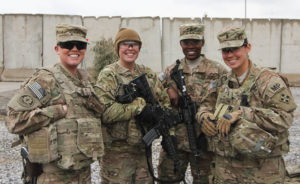
Deployed female service members reflect, look to future of women in uniform [Image 2 of 3] (U.S. Army photo by Cpl. Mariah Best)
There are likely an infinite number of outcomes that this type of prolonged service could have. The idea that a young man or woman joined the military at 18 in 2001, and is now approaching their mid-30s, is a staggering one. What were you doing at age 29? I had already started a family and had two toddlers at home. What if that was done in the midst of prolonged conflict and military service? What impact would that have on an individual?
A deeper aspect of this question is the impact on a particular group of individuals. Particularly, today, I’m talking about women in combat. For me, the question about women in combat ended a long time ago; it was never really a question, but the point became moot when I deployed to Iraq and Afghanistan in units that included both males and females. The question was answered for me when my driver dismounted behind me so I wouldn’t get shot in the back while negotiating with host nation drivers. The question was answered for me when Sgt. Eduvigues Wolf made the ultimate sacrifice and paid the ultimate price.
When we return from combat, or leave the military, there are several different aspects of what’s going on and how we need to meet those needs. How do we find meaning and purpose in our post-military lives? What impact does our service have on our transition? How do we shift our mindset from one that served us well in the military to one that is going to serve us well in the civilian world? This is different for each of us as a group, and each of us as individuals. Male veterans, female veterans, LGBTQ veterans, minority veterans, veterans from different socioeconomic backgrounds…we’re all going to react differently to transition. What are those differences?
A colleague and mentor of mine, Dannette Patterson, is trying to answer an aspect of the question: What is the impact of spirituality and religion on the reintegration needs of women veterans? She is looking for participants who are willing to take a short survey. Eligible participants for this study meet the following criteria:
(a) women veterans who are 25- years old and older,
(b) served in the United States Armed Forces during the military conflicts of Operation Iraqi Freedom or Operation Enduring Freedom in Afghanistan
(c) have been discharged from active duty military service within the last 24 months. The online survey will take approximately 20- 30 minutes to complete. If you are willing to participate in this study, please go to the following survey link:
https://www.surveymonkey.com/r/womenreintergration
Dannette’s contact information is below, if you have any questions directly for her:
Dannette Patterson, MA, LPC, NCC, CCMHC, ACS
Doctoral Candidate, Counselor Education and Supervision
Argosy University (Atlanta, Campus)
DBPATTERSON@stu.argosy
If you are interested in participating, or know of a female veteran who meets these criteria, please share this information. Your willingness to participate could help future generations of mental health professionals to provide the best possible care to those who have served and sacrificed on our behalf.


